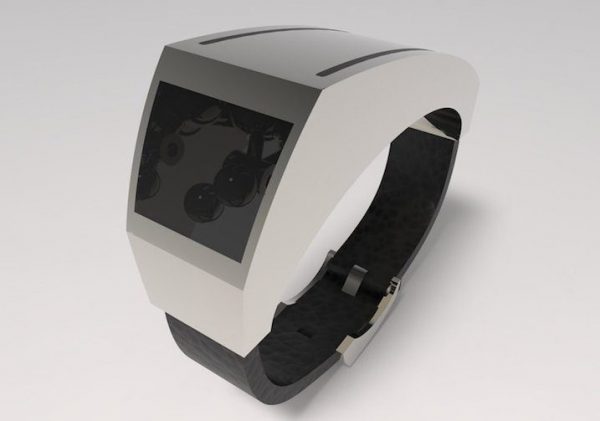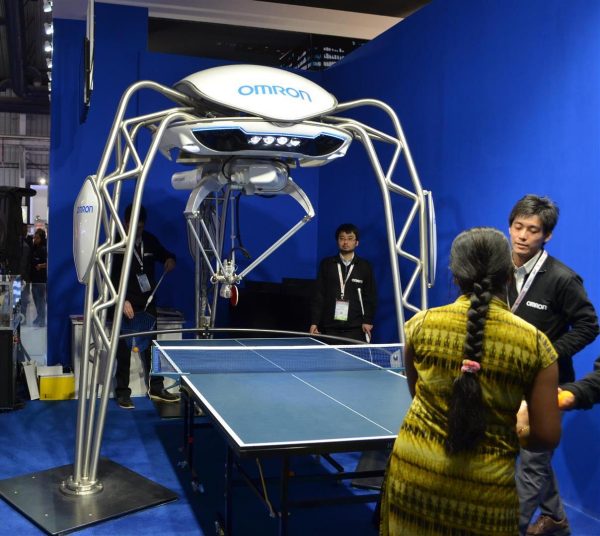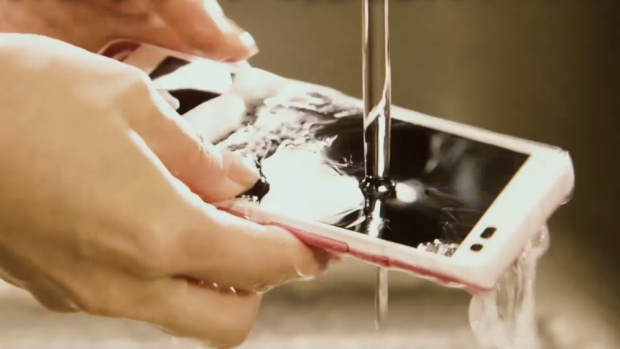Facial Scanners Installed in Beijing Public Toilets to Combat Toilet Paper Theft

To combat the rampant toilet paper theft in public toilets, local authorities in Beijing, China, have begun installing high-tech facial scanners that prevent users from taking any more toilet paper if they show up again within a certain period of time. The public toilets at the Temple of Heaven, one of the most popular tourist […]
This Weird Mask Muffles Your Voice to Keep Phone Calls Private

Don’t you just hate it when you have to take an important phone call and you’re surrounded by potential eavesdroppers? You either have to whisper or go outside to keep the conversation private, which is not exactly ideal.Now, a new gadget aims to fix this problem by muffling your voice and making you look like Bane […]
Smart Bracelet Allows Dads-to-Be to Feel The Movements of Their Unborn Children

In an effort to help expecting fathers feel more involved in the pregnancy, a Danish tech company has developed a smart bracelet that lets them feel the kicks and movements of their unborn children in real time. Fibo is the newest development in wearable technology. It looks like a cross between a fitness tracker and […]
Bizarre Smartphone App Lets You Take Photos, Talk with the Dead

In an effort to help people cope with the loss of their loved ones, a South Korean tech company is developing an app that lets them take photos and converse with digitally-rendered models of deceased friends and family. Called “With Me”, the controversial app was developed by ELROIS, a Korean firm that specializes in creating realistic 3D avatars, […]
Meet FORPHEUS, the World’s First Robot Table Tennis Tutor

An advanced robot developed by Japanese electronics company Omron has recently been certified by Guinness World Records as the world’s first robot table tennis tutor. FORPHEUS (Future Omron Robotics Technology for Exploring Possibility of Harmonized Automation with Sinic Theoretics) used machine learning to asses the skills of a human player, adjust its game accordingly and provide tips […]
Russian Programmer 3D-Prints His Very Own T-800 Terminator Robot Complete with Artificial Intelligence

The machine-dominated world envisioned by James Cameron in “Terminator” once seemed like pure science fiction, but now, not so much. Just a few days ago, a Russian programmer from Perm unveiled his 3D-printed version of the T-800 robot featured in Cameron’s famous blockbuster, and while it can currently only move its head, it is equipped […]
These “Smarter Socks” Can Communicate with Your Smartphone

What if your smartphones could send data about themselves to your iPhone? It sounds absurd, but Swiss sock manufacturer BlackSocks has been producing “Smarter Socks” that actually communicate with the owner’s smartphone ever since 2012. And yes, you can still buy them, but they’re definitely not cheap. BlackSocks believes mankind is made for greater things than […]
This Pocket-Sized Device Connects to Your Phone to Let You Know When You Stink

The KunKun, Japanese for “sniff sniff”, is a bizarre device developed by Japanese corporation Konika Minolta that detects bodily odors like smelly feet or underarm sweat and notifies the user about them via a smartphone app. So, yeah, the days of smelling your own armpits when nobody’s watching to see if they stink are over, thanks […]
BionicGym – A Leg Muscle Stimulator That Claims to Burn 1000 Calories/Hour while You Lie on the Couch

How does running a marathon and burning over 1000 calories per hour without even getting off your couch sound? That’s exactly what the BionicGym, an advanced wearable neuro-stimulator, claim to help you achieve by delivering sophisticated electric pulse patterns to your muscles. Let’s be honest, we’ve all seen commercial electrical muscle stimulation (EMS) devices before, but […]
This Device Lets You Charge Your Phone on the Go Using Your Body’s Own Energy

HandEnergy is an ingenious apple-sized device that charges your phone anytime, anywhere. But what really makes this thing special is the fact that it uses your own personal energy to do it. In a time where power-banks and solar-power devices have become mainstream, a device that lets you charge gadgets on the go doesn’t sound […]
Kissenger – The Smartphone Accessory That Lets You Kiss over Long Distances

Long distance relationships are always tough, and the lack of physical interaction is one of the main reasons for that. There’s no substituting human touch, yet, but rapidly-advancing technology already provides some intriguing alternatives. One such example is the Kissenger, a smartphone peripheral that allows users to kiss over long distances. The concept of long-distance kissing has […]
Japanese Designer Creates Solar-Powered Coat That Charges Gadgets

If you’re sick of running out of battery on your smartphone when you need it the most, and don’t mind paying a whopping $2,480 on a coat, you might want to consider getting this solar-powered jacket that can charge your gadgets on the go. COMME des GARÇONS’ alumnus Junya Watanabe first unveiled his FW16 solar-powered men’s […]
‘Magic’ Megaphone Automatically Translates Speech into Various Languages

To help Japanese companies better deal with the increasing number of foreigners visiting the country, Panasonic has created an innovative megaphone capable of automatically translating Japanese into English, Chinese and Korean. Remember that cool universal translator the crew of the Enterprise used to break down language barriers with alien species? Such technology is not yet available in […]
Nearly All Phones in Japan Are Waterproof Because People Need to Use Them in the Shower

Waterproof smartphones are becoming more common in Western markets, but they are hardly the norm. In Japan however, almost all phones are waterproof, and have been for nearly a decade now. According to statistics, 90% to 95% of phones in Japan are waterproof, because people need to be able to use them while they are showering. […]
This Little Flashlight Is So Powerful It can Start a Fire and Cook Breakfast

The FlashTorch Mini flashlight is about as close as you can get to a real-life, commercially-available lightsaber. Its 2300-lumens halogen light output is enough to start a fire or cook an egg. Created by Wicked Laser, the FlashTorch Mini is made of anodized, machined aircraft-grade aluminum and features a highly efficient, heat-resistant lens and reflector. That already sounds very impressive, but […]
